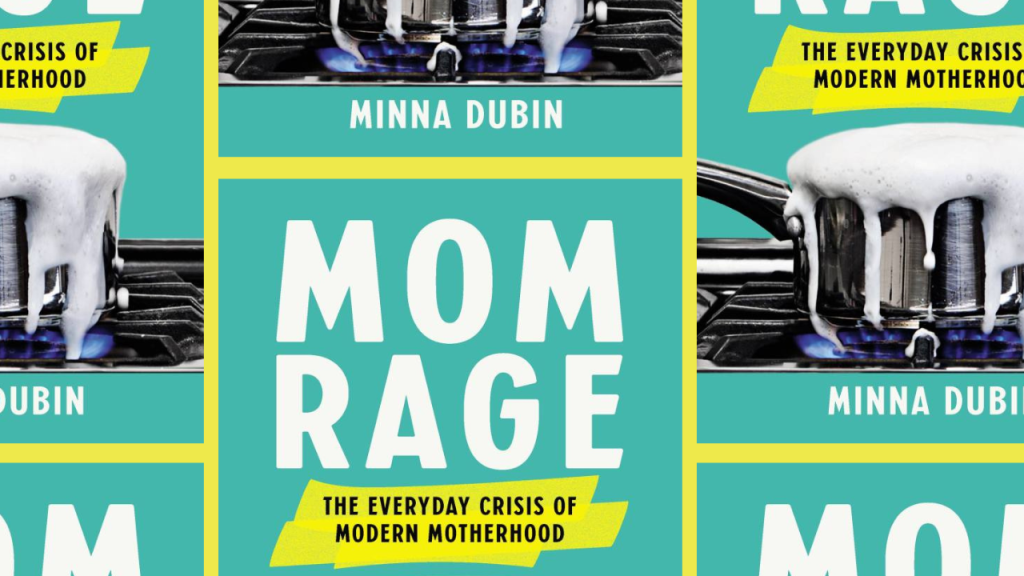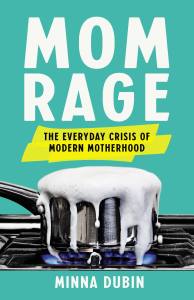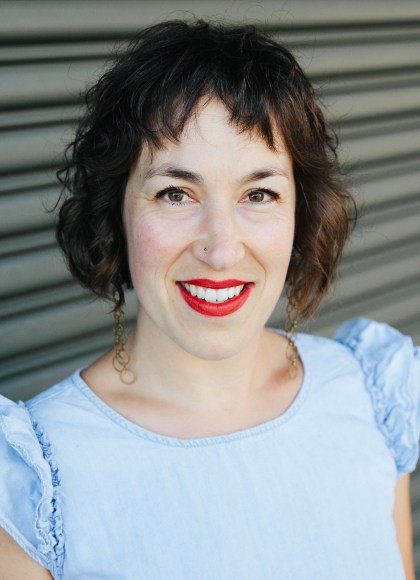Mom Rage Q&A with Minna Dubin
A frank, feminist examination of the hidden crisis of rage facing American mothers—and how we can fix it
Mothers aren’t supposed to be angry. Still, Minna Dubin was an angry mom: exhausted by the grueling, thankless work of full-time parenting and feeling her career slip away, she would find herself screaming at her child or exploding at her husband.
When Dubin pushed past her shame and talked with other mothers about how she was feeling, she realized that she was far from alone. Mom Rage is Dubin’s groundbreaking work of reportage about an unspoken crisis of anger sweeping the country—and the world. She finds that while a specific instance of rage might be triggered by something as simple as a child who won’t tie her shoes, the roots of the anger go far deeper, from the unequal burden of childcare shouldered by moms to the flattening of women’s identities once they have kids. Drawing on insights from moms across the spectrum of race, sexual orientation, and class, she offers practical tools to help readers disarm their rage in the moment, while never losing sight of the broader social change we need to stop raging for good.

- You’re obviously a mom who has been through mom rage. When did you realize you were so angry?
- My first child was around one. I’d just finished weaning, and I felt a constant sense of zinging irritation. I started seeing a therapist, who diagnosed me with “adjustment disorder.” Calling the oppressive tornado that is American motherhood an “adjustment” is the most banal understatement ever!
- What made you decide to write Mom Rage?
- I got hundreds of emails from mothers from all over the world in response to my mom rage articles in the New York Times. This indicated to me that my fury was not a “me-problem,” but the result of a widespread societal problem. I felt motivated to investigate!
- What was your writing process like for Mom Rage?
- I was eager to hear other moms’ rage stories so I started with 50 interviews of mothers from across the country and around the world. Those interviews showed me what the factors are that cause modern motherhood to be a foot-stomping, handclapping, voice-straining experience.
- Is this overwhelming exhaustion and anger something specific to this country or global?
- It’s both. Mothers all over the globe are experiencing rage, and that’s because of a variety of social factors that oppress mothers, like patriarchy and capitalism, which exist globally. But America’s refusal to implement proper mothercare policy is so egregious that it causes rage to be more rampant here.
- The big question: why are so many mothers so angry?
- This is a long a complicated answer that I spent the last three years teasing apart in order to explain it in an accessible, engaging way. I recommend reading the book. 😊
- What does feminism mean to you?
- To me, feminism means believing that everyone should get to have the same opportunities, care, and freedom in order to live in ways that feel most fulfilling and genuine to them. It’s about autonomy. We get to choose what happens with our bodies, how we spend our time, how we dress, who we love, and what we do with our lives, without threat or fear of being penalized, rejected, or unsafe.
- What kind of tips, besides read the book of course, can you offer to moms, including single moms, out there feeling overwhelmed by anger?
- Think bigger than the nuclear family, and build your community support network. Offer favors (a lasagna, a ride to school) to your local families and neighbors. That’s how we bring people into our lives, and get ourselves out of isolation and scarcity. Also, if you’re partnered, get them to read the book. Having a partner who understands your experience can be a big help, and alleviate the isolation of mom rage.
- Are there tips in this book to help address the unequal distribution of labor with co-parents, to alleviate the unbalanced load on moms?
- Yes! I talk about the nuanced differences in labor distribution in same-sex versus different-sex parenting partnerships, and how the biggest difference is that different-sex couples don’t often do much, if any, verbal negotiation around who does what tasks. Without pinpointing what the labor is (including the invisible labor like researching, scheduling, communicating, etc.), it remains unacknowledged. Then a whole bunch of time-consuming “nothing” ends up falling on the mother’s to-do list. I also have resources in the appendix written for partners of raging moms. One of them is about what partners can do in the home to alleviate mom rage. Spoiler: Do more!
- Who do you hope picks up this book and what effects would you hope for it to have on its readers?
- I hope this book provide relief and a sense of connection for mothers. But I truly believe that everyone who loves a mom should read this book: co-parents, spouses, grandparents, the adult children of formerly angry mothers. It offers a window into the emotional landscape of modern motherhood that is mostly unspoken, but certainly intimately felt.
- If there’s one thing you could tell your younger self, what would it be?
- I would tell my younger mother self to listen closely to my wise rage, because anger is a weathervane pointing to the places that need attention and healing.
Praise
-
"With an appendix of concrete tools . . . Mom Rage provides much-needed advice, company, and consolation. It also offers a timely reminder that we might use our voices for more than bedtime stories."Tanya Ward Goodman, Los Angeles Review of Books
-
“Few issues are left untouched in this thought-provoking book on a hot topic that is seldom discussed.”Library Journal
-
“an original, eye-opening look at the rage that can consume mothers… This book represents a voice that belongs in every parenting collection."Booklist
-
“a searing indictment of the failed systems of support and flawed narratives that too often surround parenthood… bound to resonate with any woman who has experienced the shift to motherhood as anything less than perfect.”Shelf Awareness
-
“The author’s candid appraisal of her own rage . . . and her penetrating insights make for captivating reading. It’s an astute account of how society fails mothers."Publishers Weekly
-
“A cleareyed analysis of the intricate web of cultural and political challenges that make female-identified parenting nearly impossible . . . the author writes with humor, vulnerability, and a level of expertise that shape her narrative into a nuanced and convincing argument for justice.”Kirkus
-
“Mom Ragemakes crucial space for all of us who have experienced the sudden, terrifying urge to stab a mattress with a kitchen knife, punch a wall, or squeeze our children a little too tightly. Dubin reminds us our darkest moments are symptoms of systemic failings, not signs of personal flaws—and that our anger should be harnessed as an animating force for equity.”Angela Garbes, author of Essential Labor
-
“Mom Rage does an expert job weaving data and research to explain why moms are in crisis while also giving us thoughtful individual and systemic solutions.”Eve Rodsky, author of Find Your Unicorn Space
-
“Breaking down the unnamable feelings so many women have as mothers, Mom Rage is a must-read for women who struggle to reconcile the cultural pressure to be 'good mothers' with the powerful negative emotions that come with parenting."Soraya Chemaly, author of Rage Becomes Her
-
“If you've ever screamed at your child in ways that shock you — and we all have, haven't we? — Mom Rage is an absolute must-read. As Minna Dubin argues, your anger is not a moral failing. This book is an eye-opening exploration of the many social forces that drive mothers to explode at their children, as well as the societal and situational solutions that could, ultimately, save us.”Melinda Wenner Moyer, author of How to Raise Kids Who Aren't Assholes
-
"Mom Rage is a critical addition to the literature of mothering, compassionately exploring the ugly, rageful moments that haunt many of us even as we struggle to do right by our kids. Dubin invites us to consider our rage in the full context of a perverse, broken, contradictory, and cruel American system that fails families at every turn. I needed the compassion of this book, as well as its expansive look of what parenting can and should be.”Lydia Kiesling, author of The Golden State
A frank, feminist examination of the hidden crisis of rage facing American mothers—and how we can fix it
Mothers aren’t supposed to be angry. Still, Minna Dubin was an angry mom: exhausted by the grueling, thankless work of full-time parenting and feeling her career slip away, she would find herself screaming at her child or exploding at her husband.
When Dubin pushed past her shame and talked with other mothers about how she was feeling, she realized that she was far from alone. Mom Rage is Dubin’s groundbreaking work of reportage about an unspoken crisis of anger sweeping the country—and the world. She finds that while a specific instance of rage might be triggered by something as simple as a child who won’t tie her shoes, the roots of the anger go far deeper, from the unequal burden of childcare shouldered by moms to the flattening of women’s identities once they have kids. Drawing on insights from moms across the spectrum of race, sexual orientation, and class, she offers practical tools to help readers disarm their rage in the moment, while never losing sight of the broader social change we need to stop raging for good.
Newsletter Signup
By clicking ‘Sign Up,’ I acknowledge that I have read and agree to Hachette Book Group’s Privacy Policy and Terms of Use

